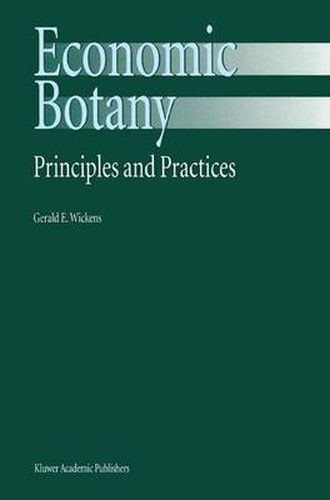Readings Newsletter
Become a Readings Member to make your shopping experience even easier.
Sign in or sign up for free!
You’re not far away from qualifying for FREE standard shipping within Australia
You’ve qualified for FREE standard shipping within Australia
The cart is loading…






This title is printed to order. This book may have been self-published. If so, we cannot guarantee the quality of the content. In the main most books will have gone through the editing process however some may not. We therefore suggest that you be aware of this before ordering this book. If in doubt check either the author or publisher’s details as we are unable to accept any returns unless they are faulty. Please contact us if you have any questions.
The strength of this book is that it is written by someone who has spent a lifetime devoted to the science of economic botany. The author has brought together his vast experience in the field in Africa with his studies of arid land plants at the Royal Botanic Gardens, Kew. The result is an informative and reliable text that covers a vast range of topics. It is also firmly based upon the author’s research and interest in plant taxonomy and therefore fully acknowledges the importance of correct naming and classification in the field of science of economic botany. The coverage is of economic botany in its broadest sense. I was delighted to find such topics as ecophysiology, plant breeding, the environment and conservation are included in the text. This gives the book a much more comprehensive coverage than most other texts on the subject. I was also glad to see that the book covers the use of various organisms that are no longer considered part of the plant kingdom such as various species of fungi and algae. It is indeed a broad ranging book that will be of use to many people interested in the uses of plants and fungi. Economic botany is once again being given more prominence as a discipline because of its enormous relevance to both conservation and sustainable development. Those people involved in those topics shOUld find this a most useful resource.
$9.00 standard shipping within Australia
FREE standard shipping within Australia for orders over $100.00
Express & International shipping calculated at checkout
Stock availability can be subject to change without notice. We recommend calling the shop or contacting our online team to check availability of low stock items. Please see our Shopping Online page for more details.
This title is printed to order. This book may have been self-published. If so, we cannot guarantee the quality of the content. In the main most books will have gone through the editing process however some may not. We therefore suggest that you be aware of this before ordering this book. If in doubt check either the author or publisher’s details as we are unable to accept any returns unless they are faulty. Please contact us if you have any questions.
The strength of this book is that it is written by someone who has spent a lifetime devoted to the science of economic botany. The author has brought together his vast experience in the field in Africa with his studies of arid land plants at the Royal Botanic Gardens, Kew. The result is an informative and reliable text that covers a vast range of topics. It is also firmly based upon the author’s research and interest in plant taxonomy and therefore fully acknowledges the importance of correct naming and classification in the field of science of economic botany. The coverage is of economic botany in its broadest sense. I was delighted to find such topics as ecophysiology, plant breeding, the environment and conservation are included in the text. This gives the book a much more comprehensive coverage than most other texts on the subject. I was also glad to see that the book covers the use of various organisms that are no longer considered part of the plant kingdom such as various species of fungi and algae. It is indeed a broad ranging book that will be of use to many people interested in the uses of plants and fungi. Economic botany is once again being given more prominence as a discipline because of its enormous relevance to both conservation and sustainable development. Those people involved in those topics shOUld find this a most useful resource.